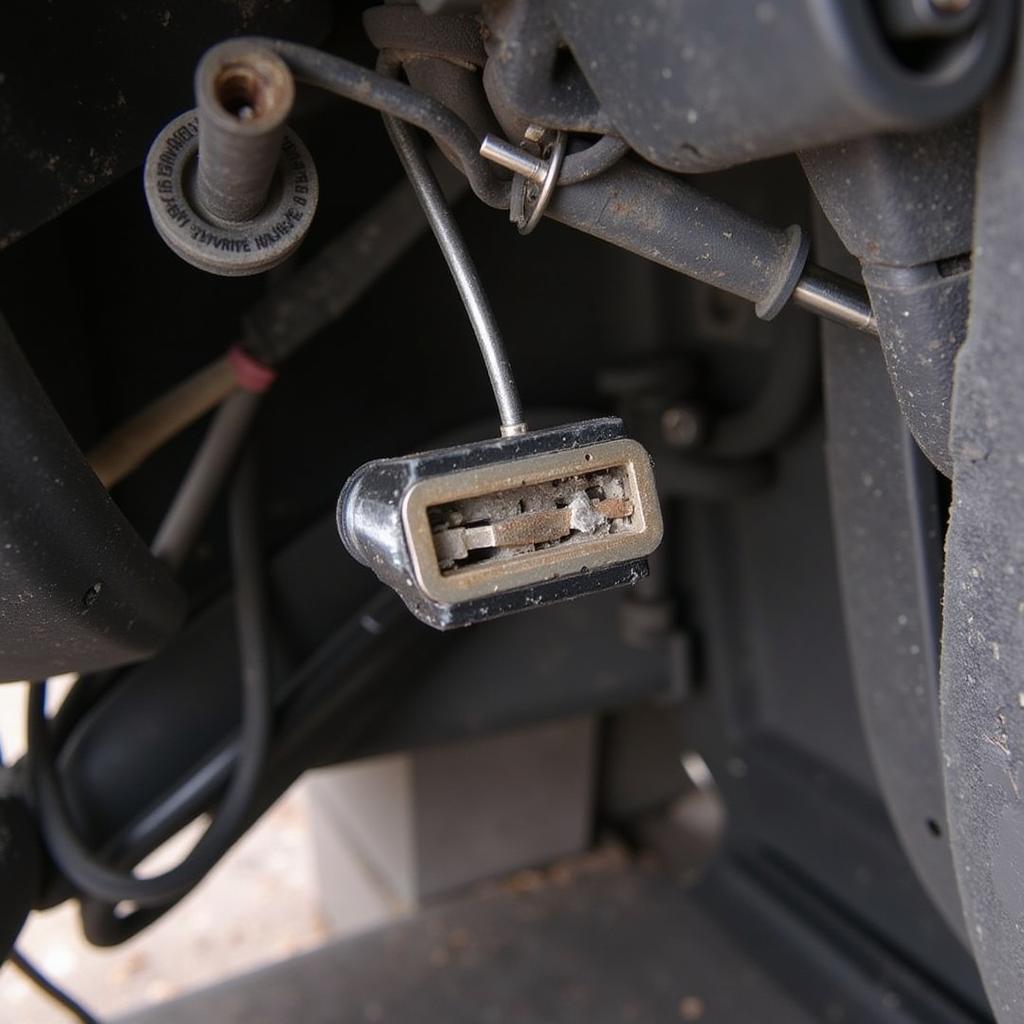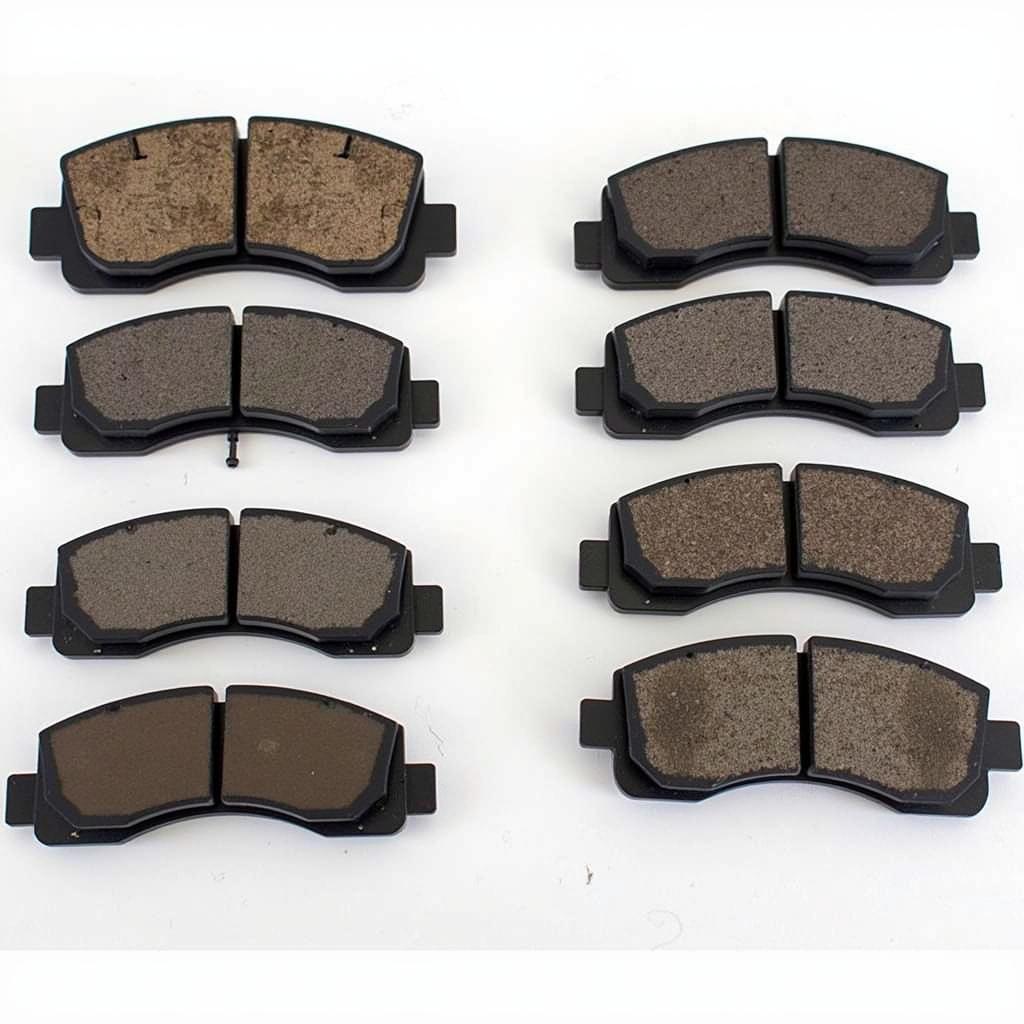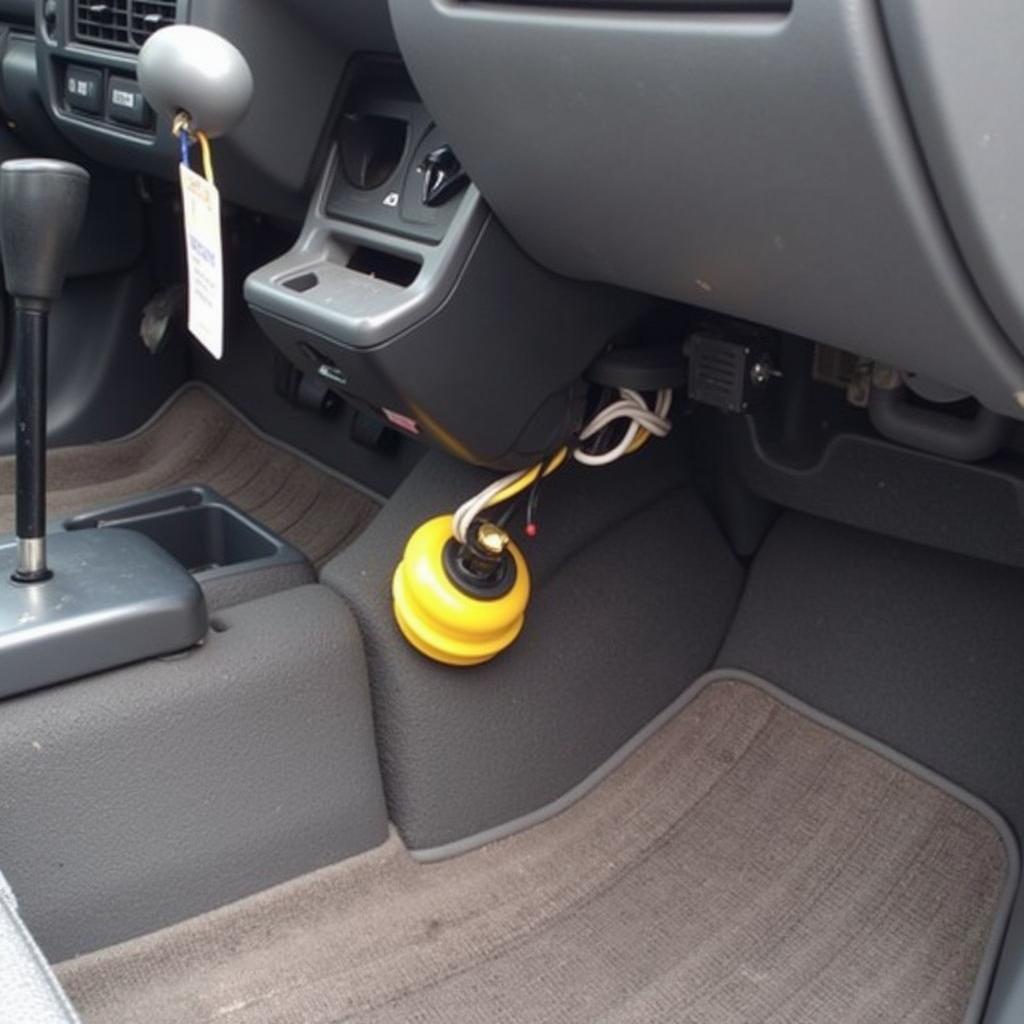You’re driving down the road and notice your brake warning light is on, but then it mysteriously turns off when you apply the brakes. This scenario might leave you confused and unsure if you have a serious problem or not. While it’s tempting to dismiss it as a fluke, a brake warning light that behaves erratically should never be ignored. It often indicates an underlying issue within your car’s complex braking system.
Understanding Your Car’s Braking System
Before we delve into the reasons behind this unusual behavior, it’s crucial to have a basic understanding of your car’s braking system. It’s a complex network of components working together to ensure safe deceleration and stopping:
- Brake Pedal: The interface between you and the braking system, converting your foot pressure into hydraulic force.
- Brake Booster: Amplifies the force from the brake pedal, making braking easier.
- Master Cylinder: Receives the amplified force and converts it into hydraulic pressure.
- Brake Lines: Carry the hydraulic pressure from the master cylinder to the brakes at each wheel.
- Brake Calipers: House the brake pads and pistons that clamp the brake pads against the rotors.
- Brake Rotors: Metal discs that rotate with the wheels, providing the friction surface for the brake pads.
- Brake Fluid: The lifeblood of the system, transmitting hydraulic pressure throughout.
- Brake Warning Light System: Monitors the system for faults and alerts the driver via the dashboard warning light.
A fault in any of these components can trigger the brake warning light. Now, let’s explore why it might turn off when you apply the brakes.
Common Causes of a Brake Warning Light Turning Off When Braking
While a temporary electrical glitch could be the culprit, the following are more common and potentially serious reasons:
1. Failing Brake Light Switch:
The brake light switch, often located near the brake pedal, is responsible for activating the brake lights when you press the pedal. A failing switch can cause erratic behavior, including turning off the brake warning light momentarily when the pedal is pressed.
 Brake Light Switch Malfunction
Brake Light Switch Malfunction
2. Worn Brake Pads:
Many modern vehicles are equipped with brake pad wear sensors. These sensors are designed to trigger the brake warning light when the brake pads reach a certain level of wear. In some cases, applying the brakes can shift the worn brake pads slightly, temporarily releasing the sensor and turning off the warning light.
 Worn Brake Pads Triggering Warning Light
Worn Brake Pads Triggering Warning Light
3. Air in the Brake Lines:
Air in the brake lines can compress, leading to a “spongy” brake pedal and inconsistent braking performance. When you press the brakes, the air compresses, potentially creating enough pressure to momentarily extinguish the warning light. However, this is a dangerous situation as air in the lines reduces braking efficiency.
4. Internal Fault in the Master Cylinder:
The master cylinder is responsible for generating the hydraulic pressure needed for braking. An internal fault, such as a leaking seal, can cause pressure fluctuations. Applying the brakes might temporarily restore pressure, switching off the warning light, but the underlying issue remains.
5. Electrical Issue:
While less common, a loose connection, short circuit, or faulty sensor within the brake warning light system itself can lead to intermittent illumination, including turning off when braking.
What to Do if Your Brake Warning Light Turns Off When Braking
If you experience this issue, it’s crucial to take immediate action. Here’s a step-by-step guide:
- Don’t Ignore the Warning: Even if the light turns off, the fact that it illuminated in the first place indicates a potential problem.
- Safely Pull Over: As soon as it’s safe, pull over to the side of the road.
- Check Brake Fluid Level: Carefully inspect the brake fluid reservoir. If the fluid level is low, it could point to a leak. However, don’t add more fluid without addressing the underlying cause.
- Avoid Driving: If you suspect any of the issues mentioned above, avoid driving your car. Continuing to drive with a compromised braking system can lead to brake failure, putting you and others at risk.
- Seek Professional Help: Contact a qualified mechanic specializing in automotive electrical and braking systems. Explain the symptoms in detail, including when the warning light illuminates and turns off.
Remote Diagnostics and Repair Solutions
In today’s technologically advanced world, remote diagnostics and repair solutions are becoming increasingly popular. If you’re experiencing brake warning light issues, consider these options:
- Remote Diagnostics: Some mechanics offer remote diagnostic services. By connecting to your car’s onboard computer, they can read error codes and assess the health of your braking system.
- Remote Programming and Software Updates: Modern cars heavily rely on software. Remote programming can address software-related issues that might be causing the erratic brake warning light behavior.
red brake warning lamp definition
When Is the Brake Warning Light Not a Cause for Concern?
There’s one scenario where the brake warning light illuminating is perfectly normal:
- Engaging the Parking Brake: The brake warning light is designed to remind you if the parking brake is engaged. It should turn off immediately when you disengage the parking brake.
Expert Insights
“We often see drivers ignoring a flashing brake warning light, assuming it’s a minor glitch,” says John Smith, a certified automotive electrician with over 20 years of experience. “However, any inconsistency in this system warrants immediate attention. It’s always better to be safe than sorry when it comes to your brakes.”
the brake warning light means __
Conclusion
A brake warning light that turns off when braking is a perplexing issue that should never be taken lightly. While it might seem counterintuitive, it often signals a problem within your braking system. From a failing brake light switch to worn brake pads or air in the lines, various culprits could be responsible. Addressing the issue promptly through professional diagnosis and repair is essential to ensure your safety on the road. Remember, a well-maintained braking system is crucial for preventing accidents and enjoying peace of mind behind the wheel.
what does the brake warning light indicate
FAQs
1. Can I drive my car if the brake warning light turns off when braking?
It’s not advisable to drive your car if you’re experiencing this issue. It indicates a potential problem with your braking system, and continuing to drive could be dangerous.
2. Is it expensive to fix a brake warning light issue?
The cost of repair varies greatly depending on the underlying cause. A simple brake light switch replacement is relatively inexpensive, while a master cylinder replacement can be more costly.
3. How often should I check my brake fluid level?
It’s a good practice to check your brake fluid level at least once a month and more frequently if you notice any changes in brake pedal feel or performance.
4. Can I add brake fluid myself if the level is low?
While it’s possible to top off the brake fluid, it’s not recommended unless you’re confident in identifying the underlying cause of the low fluid level.
5. How can I prevent brake warning light issues?
Regular car maintenance, including brake inspections and fluid flushes, can help prevent many brake-related problems, including warning light issues.


